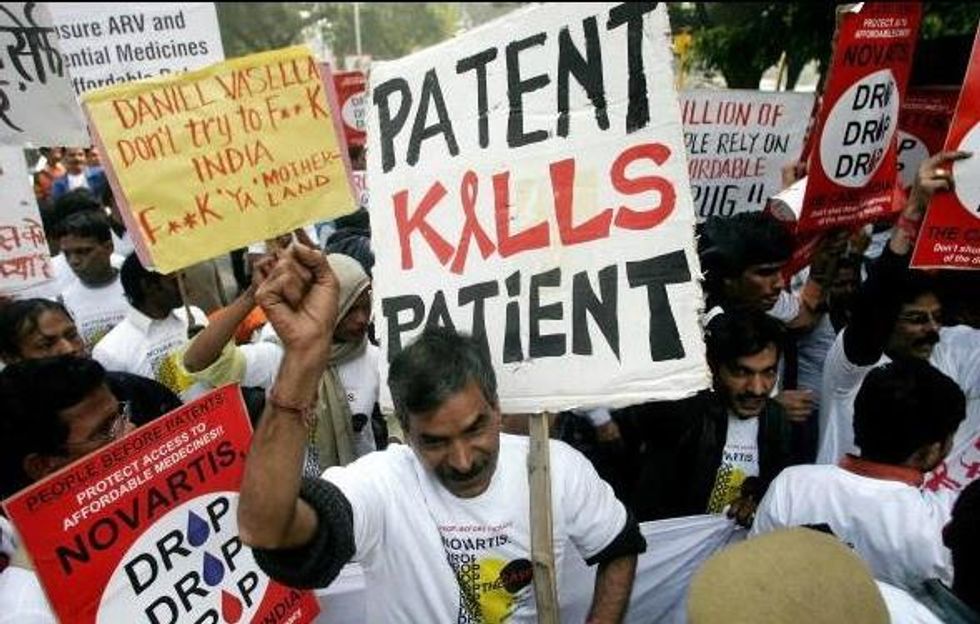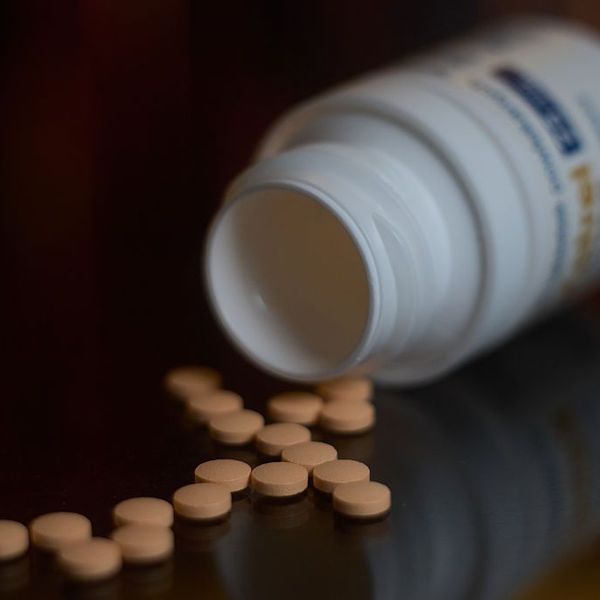Big Pharma Lobbies to Punish Makers of Affordable Drugs
Industry trade group PhRMA pushing U.S. to crack down on access to drugs treating cancer, HIV

The Indian government is "reviewing patented drugs of foreign firms to see if so-called compulsory licenses, which in effect break exclusivity rights, can be issued for some of them to bring down costs," according to a Reuters article published Thursday, which cites two senior government officials.
The review affects up to a dozen varieties of drugs used to treat cancer, diabetes, hepatitis and HIV and signifies a move to make them more affordable.
The U.S. industry trade group Pharmaceutical Research and Manufacturers of America is demanding the U.S. government intercede to prevent this from happening by placing India in the "worst offender" category regarding intellectual property -- a move that would push the U.S. government to take an even tougher line.
"The multinational companies are exploring all options - from paring their investments in the country to forcing the U.S. to take some actions," according to a New Delhi source quoted by Reuters.
The revelation comes just weeks after Chief Executive of Bayer pharmaceutical corporation Marijn Dekkers declared, following an order from an Indian court to allow a generic drug company to sell inexpensive varieties of the cancer drug Nexavar, "We did not develop this medicine for Indians. We developed it for western patients who can afford it."
_____________________
An Urgent Message From Our Co-Founder
Dear Common Dreams reader, The U.S. is on a fast track to authoritarianism like nothing I've ever seen. Meanwhile, corporate news outlets are utterly capitulating to Trump, twisting their coverage to avoid drawing his ire while lining up to stuff cash in his pockets. That's why I believe that Common Dreams is doing the best and most consequential reporting that we've ever done. Our small but mighty team is a progressive reporting powerhouse, covering the news every day that the corporate media never will. Our mission has always been simple: To inform. To inspire. And to ignite change for the common good. Now here's the key piece that I want all our readers to understand: None of this would be possible without your financial support. That's not just some fundraising cliche. It's the absolute and literal truth. We don't accept corporate advertising and never will. We don't have a paywall because we don't think people should be blocked from critical news based on their ability to pay. Everything we do is funded by the donations of readers like you. Will you donate now to help power the nonprofit, independent reporting of Common Dreams? Thank you for being a vital member of our community. Together, we can keep independent journalism alive when it’s needed most. - Craig Brown, Co-founder |

The Indian government is "reviewing patented drugs of foreign firms to see if so-called compulsory licenses, which in effect break exclusivity rights, can be issued for some of them to bring down costs," according to a Reuters article published Thursday, which cites two senior government officials.
The review affects up to a dozen varieties of drugs used to treat cancer, diabetes, hepatitis and HIV and signifies a move to make them more affordable.
The U.S. industry trade group Pharmaceutical Research and Manufacturers of America is demanding the U.S. government intercede to prevent this from happening by placing India in the "worst offender" category regarding intellectual property -- a move that would push the U.S. government to take an even tougher line.
"The multinational companies are exploring all options - from paring their investments in the country to forcing the U.S. to take some actions," according to a New Delhi source quoted by Reuters.
The revelation comes just weeks after Chief Executive of Bayer pharmaceutical corporation Marijn Dekkers declared, following an order from an Indian court to allow a generic drug company to sell inexpensive varieties of the cancer drug Nexavar, "We did not develop this medicine for Indians. We developed it for western patients who can afford it."
_____________________

The Indian government is "reviewing patented drugs of foreign firms to see if so-called compulsory licenses, which in effect break exclusivity rights, can be issued for some of them to bring down costs," according to a Reuters article published Thursday, which cites two senior government officials.
The review affects up to a dozen varieties of drugs used to treat cancer, diabetes, hepatitis and HIV and signifies a move to make them more affordable.
The U.S. industry trade group Pharmaceutical Research and Manufacturers of America is demanding the U.S. government intercede to prevent this from happening by placing India in the "worst offender" category regarding intellectual property -- a move that would push the U.S. government to take an even tougher line.
"The multinational companies are exploring all options - from paring their investments in the country to forcing the U.S. to take some actions," according to a New Delhi source quoted by Reuters.
The revelation comes just weeks after Chief Executive of Bayer pharmaceutical corporation Marijn Dekkers declared, following an order from an Indian court to allow a generic drug company to sell inexpensive varieties of the cancer drug Nexavar, "We did not develop this medicine for Indians. We developed it for western patients who can afford it."
_____________________

